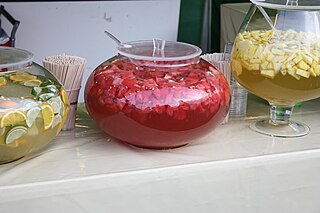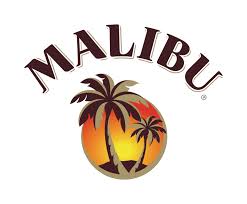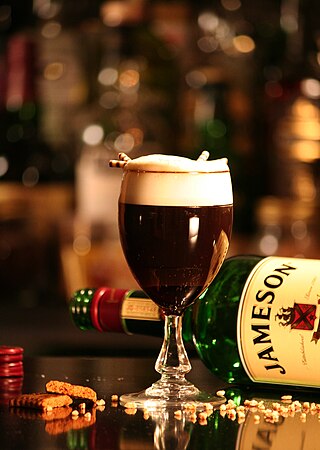Baba and similar words may refer to:
Bootleg(s), bootlegger(s), bootlegged or bootlegging may also refer to:

The term punch refers to a wide assortment of drinks, both non-alcoholic and alcoholic, generally containing fruits or fruit juice. The drink was introduced from the Indian subcontinent to England by employees of the East India Company in the late 17th century. Punch is usually served at parties in large, wide bowls, known as punch bowls.
Suleiman is the Arabic name of the Jewish and Quranic king and Islamic prophet Solomon meaning "man of peace", derived from the Hebrew name Shlomo.
Wife-beater, wifebeater, or wife beater is a slang term for a man who commits domestic violence, particularly against his wife or long term female partner.
An anchor is a device that attaches to the sea bottom to prevent a boat from drifting.

Rum-running, or bootlegging, is the illegal business of smuggling alcoholic beverages where such transportation is forbidden by law. Smuggling usually takes place to circumvent taxation or prohibition laws within a particular jurisdiction. The term rum-running is more commonly applied to smuggling over water; bootlegging is applied to smuggling over land.
Gay is a term that now primarily refers to a homosexual person or the trait of being homosexual. The term was originally used to mean "carefree", "cheerful", or "bright and showy".
Rum is a distilled alcoholic beverage made from sugarcane by-products such as molasses or sugar cane juice.

Malibu is a coconut flavored liqueur, made with Caribbean rum, and having an alcohol content by volume of 21.0 %. As of 2017 the Malibu brand is owned by Pernod Ricard, who calls it a "flavored rum", where this designation is allowed by local laws.

A rum row was a Prohibition-era term (1920–1933) referring to a line of ships loaded with liquor anchored beyond the maritime limit of the United States. These ships taunted the Eighteenth Amendment’s prohibition on the sale and consumption of alcoholic beverages. Although rum prevailed along Caribbean shores, other beverages were popular elsewhere.

A liqueur coffee is a caffeinated alcoholic drink that consists of a shot of liqueur, mixed with coffee. It is typically served in a liqueur glass, often accompanied with cream and sugar. Coffee liqueur beverages are served in different fashions and can be found throughout many countries. One of the most popular liqueur coffee beverage is commonly known as Irish coffee. Liqueur coffee beverages are largely classified as cocktails as well as digestifs which are aimed at aiding the digestive process typically after a meal.

The hurricane cocktail is a sweet alcoholic drink made with rum, lemon juice, and either passion fruit syrup or fassionola. It is one of many popular drinks served in New Orleans. It is traditionally served in the tall, curvy eponymous hurricane glass. Disposable plastic cups are also used because New Orleans laws permit drinking in public and leaving a bar with a drink, but prohibit public drinking from glass containers.
Rummy is a generic term for a family of card games.
Between the Sheets may refer to:
Iced tea is a cold tea drink.
Anne or Ann Smith may refer to:

Rum-running in Windsor, Ontario, Canada, was a major activity in the early part of the 20th century. In 1916, the State of Michigan, in the United States, banned the sale of alcohol, three years before prohibition became the national law in 1919. From that point forward, the City of Windsor, Ontario was a major site for alcohol smuggling and gang activity.
This page is based on this
Wikipedia article Text is available under the
CC BY-SA 4.0 license; additional terms may apply.
Images, videos and audio are available under their respective licenses.






